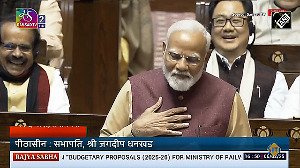Three men having ties with the Lashkar-e-Tayiba were convicted in the United States on Thursday.
The government obtained convictions on all of the most serious charges it filed against the three American Muslims -- Masoud Khan, 32, of Gaithersburg; Mohammad Siifullah Chapman, 31, of Alexandria; and Hammad Abdur-Raheem, 35, of Falls Church.
All three face a potential maximum of life in prison.
They were acquitted on some lesser firearms charges and those of commencing an expedition against a friendly nation, namely India.
Khan and Abdur-Raheem were to be sentenced on June 4 and Chapman on June 11.
"The defendants convicted were associates of a violent extremist group known as Lashkar-e-Tayiba, which operates in Pakistan and Kashmir and which has ties to the Al Qaeda terrorist network," US Attorney General John Ashcroft said.
Khan, who faced the most serious charges, was convicted of conspiracy to levy war against the US and conspiracy to contribute services to the Taliban. He faces a maximum of life plus 50 years, and related firearms convictions require mandatory minimum sentences of 90 years.
Chapman and Abdur-Raheem were convicted of providing material support to LeT and firearms charges. Chapman faces a mandatory minimum sentence of 35 years; Abdur-Raheem does not face a mandatory minimum.
Prosecutors said the three men were part of a "Virginia jihad network" that used paintball games in 2000 and 2001 to train for a holy war.
After the September 11 attacks, the group turned its intentions toward America, and several members, including Khan, travelled to Pakistan in the days after the attacks to train with Lashkar in the hopes of joining the Taliban and fighting against the US, they said.
Chapman and Abdur-Raheem testified in their own defence and said the paintball games were innocent fun and fellowship among a group of Muslim friends.
Chapman admitted attending a Lashkar camp in August 2001 but said he did so not to train for holy war but for a gruelling physical challenge in the rugged Pakistani mountains. Khan did not testify, but his lawyers denied any hostile intent.
Judge Leonie Brinkema, who imposed the convictions in US District Court in Alexandria, Virginia, said she did not believe Chapman and Abdur-Raheem's testimony.
All three defendants waived their right to a jury trial, leaving Brinkema to decide guilt or innocence.
Abdur-Raheem's father, King Lyon, alleged the government's case was "cerebral," meaning prosecutors tried to read the minds of the defendants and show hostile intent.
Soon after the judge announced the verdict, a large group of local Muslims demonstrated to protest the convictions.
Shaker Elsayed, secretary general, Muslim American Council, told reporters outside the courtroom that the verdicts were an example of "US Justice Department rule by paranoia".






 © 2025
© 2025